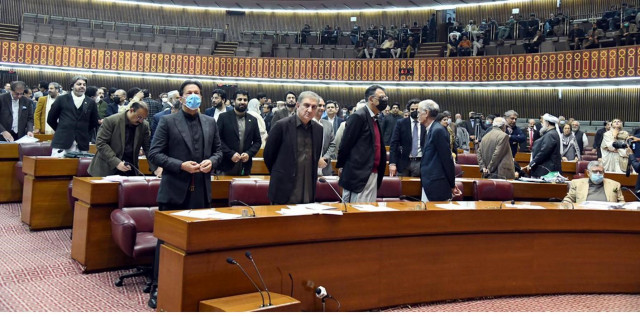PTI MNAs to confirm resignations ‘individually’
Every lawmaker must personally verify their resignation, reads letter

The National Assembly on Sunday announced a clear policy regarding the confirmation of resignations of the PTI members, according to which, every party MNA had to personally confirm his resignation.
The NA spokesperson said the PTI’s request for joint appearance and confirmation of resignations from their respective seats is being heard once again, adding that a reply was sent to the letter sent by PTI Vice Chairman Shah Mahmood Qureshi on December 22.
The PTI MNAs, according to the contents of the NA letter, will be called to confirm the resignations and each member will have to confirm his resignation in person.
The NA Secretariat said that there was "no way" the resignations of the PTI lawmakers could be verified collectively, which had been pending with the speaker despite a lapse of several months and repeated requests from the party leadership to accept them.
One hundred and twenty-three PTI MNAs had resigned en masse on April 11 two days after party Chairman Imran Khan was ousted as the prime minister through a no-confidence motion.
However, on April 17, the newly elected NA Speaker Raja Pervaiz Ashraf directed the assembly secretariat to deal with the resignations of the PTI lawmakers afresh and present them before him so that they could be treated as per law.
The ruling of the 22nd speaker of the assembly had come amid claims and speculations that some of the PTI lawmakers had been willing to retract and had been conveying messages that their resignations should not be accepted.
Later in June, the ruling coalition had formulated a strategy on the matter of en masse resignations of the PTI lawmakers from the assembly and agreed to proceed with phase-wise acceptance, following which, the NA speaker proceeded to accept 11 of the 123 resignations.
Meanwhile, parliamentary sources had disclosed that about 30 members of the former ruling party did not want to resign from the legislature, adding that the lawmakers could directly reach out to the NA speaker to stop the acceptance of their resignations.
Later, the Islamabad High Court (IHC) had termed the resignations of 123 PTI MNAs “suspicious” after it was informed that the parliamentarians were not called in a personal capacity before the NA speaker and it also suspended the resignation of one out of the 11 accepted resignations.
The speaker had also time and again urged the PTI lawmakers to return to parliament, saying he would not accept any of their resignations unless he was “satisfied” that they were not tendered under duress.
In his letter, Qureshi had requested Ashraf to set a time within a week for the formal verification of the resignations of party members, who had resigned back in April this year.
The PTI was expected to appear in the lower house on December 28 to verify its members' resignations.
In the NA letter, the party's possible return to parliament was welcomed. However, it was also stated that after consultation with the speaker, senior parliamentarians, and constitutional experts, an agreement was reached that en masse verifications were nonetheless “impossible”.
"Every member of the NA will have to personally confirm his resignation," the letter read, adding that the lower house would be convened under Paragraph (B) of Sub-Rule 43 of the Rules of Procedure, 2007 for the confirmation of their resignations.
It said that the letter was written on May 23 to confirm the resignations submitted on April 11, giving a deadline of June 6 to 10 to confirm the resignations.
Despite being formally invited, the letter stated, no member of the PTI came to the NA to confirm their resignation.
The speaker had said in the letter that PTI members would be called individually to confirm their resignations.



















COMMENTS
Comments are moderated and generally will be posted if they are on-topic and not abusive.
For more information, please see our Comments FAQ